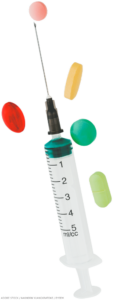 Lower HCQ Serum Levels Associated with SLE Flare, Damage & Mortality
Lower HCQ Serum Levels Associated with SLE Flare, Damage & Mortality
Background & Objectives: Nguyen et al. set out to assess the consequences of severe non-adherence to hydroxychloroquine (HCQ) by measuring hydroxychloroquine serum levels, risks of systemic lupus erythematosus (SLE) flares, damage and mortality over five years of follow-up.
Methods: The Systemic Lupus Erythematosus International Collaborating Clinics (SLICC) Inception Cohort is a multi-center initiative with subjects recruited between 1999 and 2011 from 33 centers in 11 countries in North America, Europe and Asia. After the enrollment visit, patients were seen annually at their study center by a clinician who completed a detailed case report form. Data were submitted to the coordinating center at the University of Toronto for storage in a centralized database.
Nguyen et al. analyzed serum samples of patients who had been prescribed HCQ for at least three months at cohort enrollment. The current HCQ course, including the start date and average dose, were collected at enrollment and at each subsequent visit. Severe non-adherence was defined by a serum HCQ level less than 106 ng/mL or less than 53 ng/mL, for HCQ doses of 400 or 200 mg per day, respectively.
Nguyen et al. used logistic regression models to assess the association between severe non-adherence and an SLE flare. Associations with damage and mortality were analyzed with separate Cox proportional hazard models.
Results: Of 1,849 cohort subjects, 660 patients (88% women) were included in the study. Median serum HCQ was 388 ng/mL, and 48 patients had severe HCQ non-adherence. Severe non-adherence was independently associated with both flare and an increase in the SDI within each of the first three years. Eleven patients died within five years, including three with severe non-adherence.
Conclusion
Severe non-adherence was independently associated with the risks of an SLE flare in the following year, early damage and five-year mortality. Nguyen et al. advise that severe non-adherence should be actively sought by assessing HCQ levels as a first step toward improving treatment adherence.
For complete details, including source material, refer to the full study.
Excerpted and adapted from:
Nguyen Y, Blanchet B, Urowitz MB, et al. Association between severe non-adherence to hydroxychloroquine and SLE flares, damage, and mortality in 660 patients from the SLICC Inception Cohort. Arthritis Rheumatol. 2023 Dec;75(12):2195–2206.


